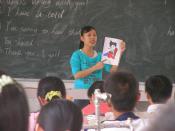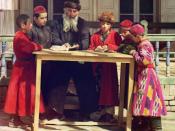The genre approach to literacy "involves the direct teaching of a range of genres through a cycle that includes modelling, joint construction and independent construction". (Green and Campbell 2003, 209). This approach promotes a selection of text types that are "modelled, jointly constructed with the teacher and then independently written by the children" (Derewianka, 1990, in Green and Campbell, 2003, 133). This can be a useful approach to take, because when planning a writing program for students, many aspects of writing need to be considered, including "the nature of writing, the relationship between writing and reading [and] the way the social purposes of writing change for different groups in our culture." (Green and Campbell, 2003, 132).
The major forms promoted by the genre approach are narrative, recount, report, explanation, exposition and procedure. This essay will focus on the features of procedures and show how they may be introduced into the primary English classroom using the genre approach.
Procedures are a type of text which give the reader a detailed factual description of a process, using instructional language. A procedure is made up of sequential general events providing instructions for undertaking a task, and usually comprises three parts: goal, materials and method. The reader is not necessarily mentioned, and if referred to, then only in a general way. The tense within a procedure is usually present, and the linking words in the text refer to time or position eg: first, next, after, when, etc. (Workshop materials, 282 Reader, 277). Other features include generalised and specific participants as nouns, (ingredients; butter, sugar, eggs) while detailed information is provided by the use of adjectives and adverbs (chopped, roughly) Green and Campbell 2003, 76). How to read maps, write or follow recipes, write up an experiment, follow the rules of a game, or...


